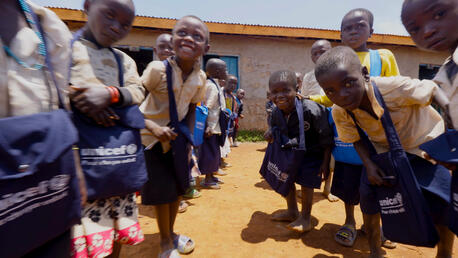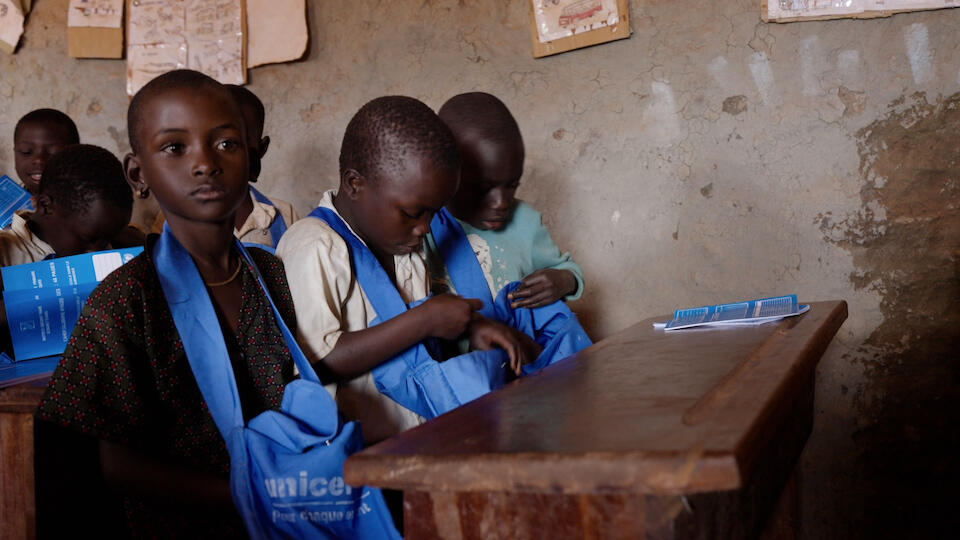
Community School in Eastern DRC Welcomes Displaced Boys and Girls With UNICEF's Help
An important part of UNICEF's emergency response to the humanitarian crisis in eastern Democratic Republic of the Congo is helping local schools accommodate growing numbers of children — boys and girls — living in nearby displacement camps. A look at how one school is rising to the challenge.
Camp Rhoe, located some 28 miles northeast of Bunia, the provincial capital of Ituri province, is home to about 70,000 people who have been displaced by violence and insecurity that continues to grip the Democratic Republic of the Congo's eastern region. Many have been displaced multiple times, fleeing attacks by armed groups.
For children living at the camp — where food, shelter, protection, security and sanitation are limited — the community school is the one constant. Founder and headmaster Ngasha Lera "Papa" Salomon is proud of how the school has evolved to accommodate more students, including hundreds of girls. Sifa Zave Marienne, a former student turned teacher, is a testament to the school's inclusive culture.
UNICEF has helped the school build its capacity to serve more students, providing learning materials and helping to convert temporary classrooms into permanent structures. Watch the video:
One of the worst humanitarian crises in Africa is going on right now in eastern DRC
UNICEF's response to the ongoing crisis in eastern DRC is not just about addressing the disruption to children's education — though getting kids back to learning is considered a crucial piece of humanitarian support.
UNICEF is also working alongside local partners to help meet other urgent needs, including shelter, safe water, health care, nutrition and protection.
Ongoing efforts include connecting displacement camps to municipal water systems so that residents can more efficiently access safe drinking water, and supporting community health workers to strengthen primary health care services.

Efforts to distribute emergency supplies and humanitarian cash transfers to displaced families in need reached nearly 258,000 people in eastern DRC between June and November 2023.
The water improvement projects in particular show how humanitarian action and development work can overlap — with powerful results.
Improving access to safe drinking water at DRC displacement camps
The Bushagara camp for displaced families, situated on the outskirts of Goma in eastern DRC, received a massive upgrade to its water infrastructure last September; with UNICEF's support, the camp was connected to the municipal water grid — an especially challenging project given the area is bone-dry and covered in volcanic rock.
New reservoirs that UNICEF helped build are now supplied directly from the local water distribution network, thanks to new pumps and miles of new piping connecting them to the municipal system's water main. Another displacement site at Kanyaruchinya as well as households in the surrounding community will also benefit from the new network's distribution points. A total of 150,000 people will be served.
“In a crisis like this, we are looking to how we can bring about lasting change,” UNICEF Representative in DRC Grant Leaity said. “The water trucking was hard to sustain especially with current levels of funding. The economics will mean the new system will offer much greater value for money, and will leave a lasting legacy not only for displaced people, but everyone living in this area north of Goma.”
"In a crisis like this, we are looking to how we can bring about lasting change." — Grant Leaity, UNICEF Representative in DRC
Bushagara now has 10 water stations with six taps each, along with 240 latrines and 120 showers built through a partnership with a local NGO and with funding from the UN’s Central Emergency Response Fund. There are plans to add more latrines and showers as the camp expands, UNICEF reported.
Improving water services, sanitation and hygiene at the camps is critical for preventing the spread of waterborne diseases. Eastern DRC is at the center of the country’s worst cholera outbreak since 2017.
Learn more about what UNICEF is doing in DRC to provide children and families with lifesaving and life-sustaining services and support.


